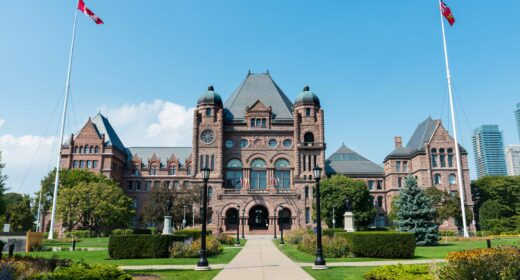When it comes to a legal case, the media can be your best friend or your worst enemy. You might want to use the media as leverage to shame a bullying employer. Or, on the flip side, your grievor might be a wronged individual who doesn’t come across quite as you would like. When the media sniffs something interesting in a case, they can be hard to put off. So what are the rules around when the media can attend an arbitration?
Generally, in accordance with the principle that the functioning of legal institutions should be transparent, there is a presumption that court proceedings are normally open to the public. Legislation often extends this presumption to the deliberations of various statutory or “quasi-judicial” tribunals (i.e. the Ontario Statutory Powers Procedure Act limits the times when tribunals are free to depart from the norm of open hearings). There is some debate about whether the open court principle applies to arbitrators and tribunals.
In Air Canada and I.A.M., Lodge 1571 (1978), 18 L.A.C. (2d) 113, the media requested they be admitted to the proceedings, and Arbitrator Frumkin denied the request. He held that it was generally accepted that arbitrators have the inherent authority to determine the procedure of the arbitration hearing and to make all necessary decisions that they might deem appropriate in the circumstances.
He held that while an arbitrator can make the hearing open to the public, absent an express provision in the Collective Agreement, the public did not have a legal right to attend the hearing. After considering the question, he held that the grievance process was supposed to de-escalate the differences between parties. The media attention would have only emphasized the differences and prevent them from resolving and escalate disharmony.
Early Divisional Court decisions did hold that “the public has an interest in the functioning of statutory arbitration tribunals”, but went on to hold that “there is a discretion to determine whether the public should be admitted to the proceedings of a board. That discretion is, however, the board’s and not that of this Court on judicial review” (Toronto Star Ltd. And Toronto Newspaper Guild, Local 87 (1976), 73 D.L.R. (3d) 370). Subsequently, Arbitrators have read this as establishing a presumption, rebuttable only in exceptional circumstances, that hearings should be open to the public.
More recently, arbitrators have come to express the view that there is no presumption favouring either the inclusion or the exclusion of the public; in each case, it is simply an issue for the arbitrator to decide by weighing the competing.
In Ottawa Public Library and Ottawa-Carleton Public Employees Union, Local 503 (2003), 117 L.A.C. (4th) 435, Arbitrator Baxter held that the present prevailing view was that an arbitrator ought to look at the particular facts of the case at arbitration in exercising the discretion, taking into account the interests of the parties and take a “case by case” approach.
In that case, there was no doubt it would generate a great deal of public interest and this was a public institution using public funds. The grievance dealt with human rights and the outcome could affect the public. These were all factors weighing in favour of allowing public access.
Conversely, there is the right of the employer to a fair hearing. The employer had sought the exclusion of witnesses, and there would be a serious credibility issue which the presence of media would impact. A public hearing could also undermine good collective bargaining, and there was a reasonable apprehension of damage to the image and reputation of the employer.
He concluded that where credibility is a real and not a remote concern it is a persuasive factor. The arbitrator has an obligation not only to the parties, but to the process. Given he was making findings of fact that might have led to the conclusion the employer created a poisoned work environment, the employer had to be allowed to challenge the testimony of witnesses making the allegations and there was the possibility of witness testimony being tainted, consciously or unconsciously, as a result of media coverage. As an arbitrator, he did not have the power to order a publication ban, so the hearing was not open to the public.
How an arbitrator will exercise their discretion may depend on a number of factors, including:
- The nature of the dispute;
- The context of the dispute;
- The implications upon an order excluding witnesses;
- The impact of the proceedings if observers and/or the media are present;
- The nature of the employer’s enterprise, whether it is a public or private institution;
- The sensitivities raised by the issues;
- Confidentiality of witnesses and private information;
- Whether there is any legitimate public interest in the issues;
- The extent to which the matter is already a matter of public knowledge or the subject of media coverage; and
- The labour relations implications of such an order.
Media can be a tricky thing, and attendance of the media at a hearing can significantly change the dynamics in the room. Whether you are trying to get the media in or keep them out, look to the above factors to craft your argument in trying to convince the arbitrator to decide in your favour.


